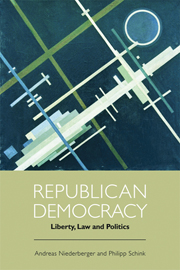Book contents
- Frontmatter
- Contents
- List of contributors
- Introduction
- 1 The Tension between Law and Politics in the Modern Republican Tradition
- 2 Impotence, Perspicuity and the Rule of Law: James Madison's Critique of Republican Legislation
- 3 Kant, Madison and the Problem of Transnational Order: Popular Sovereignty in Multilevel Systems
- 4 Republicanism and Democracy
- 5 Two Views of the City: Republicanism and Law
- 6 A Kantian Republican Conception of Justice as Nondomination
- 7 Two Republican Traditions
- 8 Freedom, Control and the State
- 9 Legal Modes and Democratic Citizens in Republican Theory
- 10 Rights, Republicanism and Democracy
- 11 Republicanism and Global Justice: A Sketch
- 12 Republicanism and Transnational Democracy
- Index
4 - Republicanism and Democracy
Published online by Cambridge University Press: 05 October 2013
- Frontmatter
- Contents
- List of contributors
- Introduction
- 1 The Tension between Law and Politics in the Modern Republican Tradition
- 2 Impotence, Perspicuity and the Rule of Law: James Madison's Critique of Republican Legislation
- 3 Kant, Madison and the Problem of Transnational Order: Popular Sovereignty in Multilevel Systems
- 4 Republicanism and Democracy
- 5 Two Views of the City: Republicanism and Law
- 6 A Kantian Republican Conception of Justice as Nondomination
- 7 Two Republican Traditions
- 8 Freedom, Control and the State
- 9 Legal Modes and Democratic Citizens in Republican Theory
- 10 Rights, Republicanism and Democracy
- 11 Republicanism and Global Justice: A Sketch
- 12 Republicanism and Transnational Democracy
- Index
Summary
Democrats should worry when philosophers begin to speak the language of “republicanism.” When philosophers espouse purportedly objective principles, such as the common good, the rule of law, depolitization – that is, normative standards that they claim will make democracy operate more justly – democrats should be very worried indeed. History teaches that this discourse of republicanism – of a common good not fully achievable through extensive popular participation and ultimate popular judgment – enjoys a rather dubious legacy. Republicanism, in its original forms, either prompted aristocratic coups against popular governments, or justified oligarchic consolidation once democratic regimes had been overthrown. On principle, neither of these outcomes is necessarily problematic for contemporary adherents of philosophical republicanism; after all, as I demonstrate in what follows, they value popular participation much less than they do policy outcomes that supposedly benefit the populace at large or track the common good. Minimal authorization of elite governance by common citizens, they suppose, is sufficient to promote and protect liberty.
- Type
- Chapter
- Information
- Republican DemocracyLiberty, Law and Politics, pp. 89 - 127Publisher: Edinburgh University PressPrint publication year: 2013



